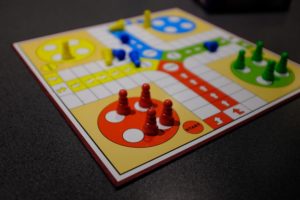
Life can wear you down. Make you cynical. Pessimistic. All kinds of negative things. And it can seem sometimes that in order to be successful in your work that you have to be serious all the time. Focused on the task. Doing the difficult things. Making yourself uncomfortable.
And that is true. I agree with those things. But a fine line with work, and other aspects of life, is that something can be challenging and fun at the same time.
When I enrolled in college I signed up for a two-day event that occurred just before move-in at the dorms. There were about 20 incoming freshman that signed up. We participated in little challenges, both mental and physical. Rope climbing and all kinds of things. It was challenging. It was uncomfortable. It was difficult.
But it was also fun and playful. I learned a lot. I met new people. It was great.
Here are some thoughts on bringing more playfulness to the workplace.
1. Regular Free Play Time
When I was a kid I loved playing basketball. Often in organized team sports you show up for practice and start doing drills and scrimmages and those types of things. It’s a very managed situation.
But I remember one year the coach we had would let us have a “shootaround” for about 15 minutes at the start of practice. No rules. We could shoot. But often we would scrimmage or have little shooting challenges. We, the players, would create the rules for whatever we were doing. If we scrimmaged, we called our own fouls. We did our own shot clocks. All kinds of things.
That was the best a team ever did that I was part of. Was it because of that free play time early in practice? Maybe, maybe not. But it was certainly a fun season. We looked forward to it every day.
You can do the same in a workplace. You can encourage employees to enjoy certain free time. Alone and in small groups or in large groups. I know that Google used to do this with their 10% free time or personal work time each week. Employees could work on whatever they wanted. No rules.
2. Less And Less Micro Managing
My home state is Wisconsin. One of the greatest leaders of all time was Vince Lombardi. He was the Packers’ coach throughout the ’60s when the team won 5 championships including three in a row including the first two Super Bowls.
If you look at old videos from games in that era you often see Vince just standing there. He was boisterous so he may sling a few comments at players and officials. But he didn’t seem to be calling plays or anything like that. The players, especially Bart Starr, were kind of coaches on the field.
In fact, one of the most famous plays in the history of the NFL was called by Starr. It was in the Ice Bowl. The Packers had the ball down on the 1-yard line and were looking to score. Starr called timeout and came over to the coach with an idea. Vince told him to run it and score so they could get the heck off the field.
And Starr did just that.
It seems that great leaders often focus on giving their best team members more responsibility over time. They certainly focus on fundamentals and provide direction and feedback. But they also want the team members to hold responsibility. They want to hold each person responsible for outcomes.
That sneak was likely not the first time Starr had taken responsibility for a play call. He was obviously willing to deal with the result, good or bad. That comes from repetition. Not just of a play, but of responsibility.
3. Work And Non-Work Activities
Play and games are a large part of life. We learn so many aspects of human interaction through games. When it comes to our coworkers, it’s important to have a playfulness to work. And it’s also important to include playfulness in some non-work activities.
These are often described as team building exercises. You may go to a paintball field. Maybe you just take the team bowling or some other activity. When I was working in the corporate world we would go tubing down the local river in the summertime.
Just getting the team outside of the normal routine and setting seemed to bring out new characteristics of each person. Our senses were more acute. We had different conversations. We learned more about each other. We even occasionally had ideas for improving in the office.
Final Thoughts
You’re probably picking up on many of the positive side effects of playfulness in work and life. Responsibility is a big one. Creativeness is another. Learning to observe is a good one. Learning how to interact with a group and with individuals is huge.
I remember, for example, playing in a golf event with a coworker. After the first bad shot he had a really big outburst. He threw his club. I had previously only seen the fun loving side of him. After that bad shot and reaction I definitely saw a line that shouldn’t be crossed as far as pushing him with work-related tasks and questions.
Look for ways to include more play in your work. It’s not just something for kids.
